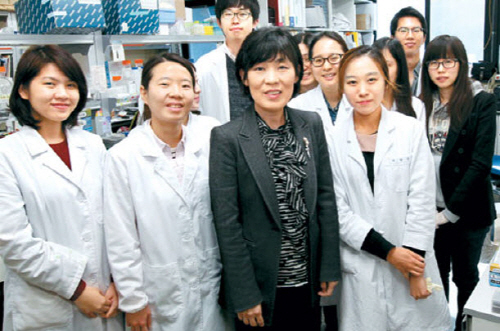
Professor LEE Ho Young’s team
Professor LEE Ho Young (Laboratory of Carcinogenesis and Drug Resistance, College of Pharmacy) and her research team have discovered the mechanism behind the effects of targeted cancer therapy, which may help develop new treatment methods to combat against cancer.
One of the most widely used cancer treatments in modern medicine involves the use of targeted therapy. The treatment involves agents that target specific molecular mutations that are found in cancer cells. As the therapy does not involve other non-cancerous cells, targeted therapy has been hailed as a medical breakthrough over other conventional treatments such as chemotherapy. However, there are still limitations to the treatment method, and specifically the Insulin-like Growth Factor 1 Receptor (IGF-1R) targeted therapy has the side effect of metastasis (spread of cancer cells to other parts of the body). Consequentially, IGF-1R targeted therapy has not been approved for therapeutic use as of yet. Through two years of research, Professor Lee and her team have identified the reasons behind the metastasis and the research may pave way for a new technique of targeted therapy for patients.
According to Professor Lee’s findings, the IGF-1R targeted therapy leads to the formation of blood vessels that causes metastasis. IGF-1R is a protein that is found on the surface of human cells, and plays an important role in growth. However, it is also responsible for cancerous cell growth in the breast and the prostate. Previous treatment methods for IGF-1R, such as radiotherapy and chemotherapy, have been ineffective due to the nature of the protein. Meanwhile, targeted therapy for IGF-1R has proven to be successful in destroying the particular protein. Despite the therapy’s effectiveness against cancer cells in the targeted area, it has the side effect of metastasis, which has puzzled researchers. Professor Lee’s research has shown that the treatment, while targeting cancer cells, also leads to the formation of the protein IGF-2R, which interacts with neighboring non-cancerous cells in the region and accelerates the formation of blood vessels. The new blood vessels then act as a device to transport the cancer cells to other areas of the body, resulting in metastasis.
Professor Lee’s research is widely recognized in the international research community, and her findings were published in the journal Nature Communications, the online publication for Nature magazine. Cancer is one of the leading causes of mortality worldwide and over the past few years, the number of cancer patients has steadily increased in the aging population of South Korea. As of 2012, there were more than 200,000 patients suffering from cancer in the country. Professor Lee’s explanation of the mechanism behind the metastasis after IGF-1R therapy will possibly provide answers towards developing a new and effective targeted therapy method, giving hope to patients who suffer from cancer.
- This research was published in the October 14th issue of Nature Communications.
- Professor LEE Ho Young’s Lab: http://www.snupharm.ac.kr/hylee/intex.asp
- SNU College of Pharmacy: http://www.snupharm.ac.kr/eng/
Written by Yun Hwan Chae, SNU English Editor, yunhwanchae@snu.ac.kr
Reviewed by Eli Park Sorensen, SNU Professor of Liberal Studies, eps7257@snu.ac.kr

